
In an extensive study at the University of California, Riverside, researchers have found that high consumption of soybean oil can lead to an increase in harmful bacteria in the gut, potentially causing colitis and IBD. The linoleic acid in soybean oil was identified as the primary concern, with researchers observing that excess amounts negatively affect the gut microbiome.
UC Riverside-led mouse study reports diets high in soybean oil decrease endocannabinoids in the gut and can lead to colitis.
High consumption of soybean oil has been linked to multiple health issues including obesity and diabetes and potentially autism, Alzheimer’s disease, anxiety, and depression. Recent research has added ulcerative colitis to this growing list. Ulcerative colitis is a form of inflammatory bowel disease (IBD) characterized by chronic inflammation of the large intestine.
Researchers at the University of California, Riverside, examined the gut of mice that were consistently fed a diet high in soybean oil for up to 24 weeks in the lab. They found beneficial bacteria decreased and harmful bacteria (specifically, adherent invasive Escherichia coli) increased — conditions that can lead to colitis.

Photo shows, from L to R, Frances Sladek, James Borneman, and Poonamjot Deol. Credit: Stan Lim, UC Riverside
Soybean oil is the most commonly used edible oil in the United States and is increasingly being used in other countries, particularly Brazil, China, and India. In the U.S., soybean production took off in the 1970s for use as animal feed; a byproduct of the increasing trend in growth was soybean oil. Soybeans, a good source of protein, are easy and cheap to grow.
“Our work challenges the decades-old thinking that many chronic diseases stem from the consumption of excess saturated fats from animal products, and that, conversely, unsaturated fats from plants are necessarily more healthful,” said Poonamjot Deol, an assistant professional researcher in the Department of Microbiology and Plant Pathology and a co-corresponding author on the paper published on July 3 in Gut Microbes, an open access journal.
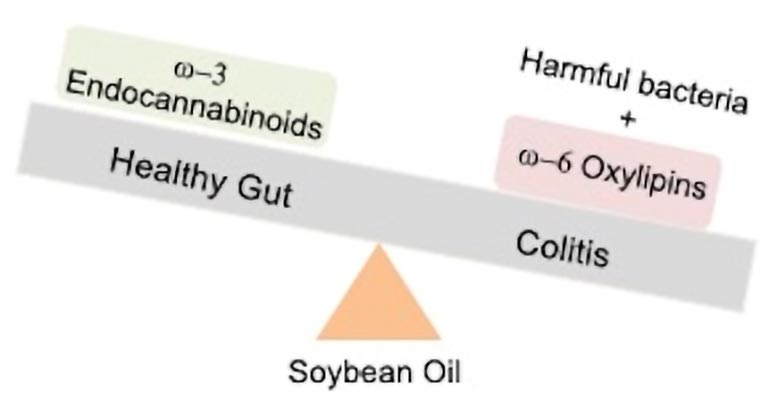
A diet high in soybean oil is found to encourage the growth of harmful bacteria such as adherent invasive E. coli in the gut. Credit: Sladek lab, UC Riverside
Deol explained it is linoleic acid in soybean oil that is the main concern.
“While our bodies need 1-2% of linoleic acid daily, based on the paleodiet, Americans today are getting 8-10% of their energy from linoleic acid daily, most of it from soybean oil,” she said. “Excessive linoleic acid negatively affects the gut microbiome.”
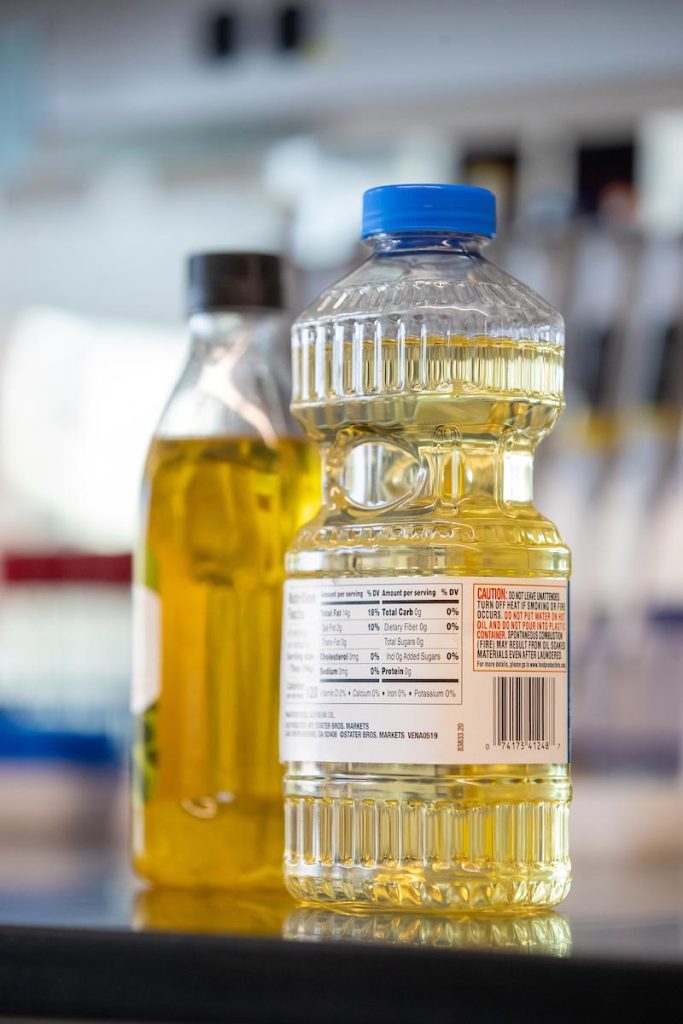
Soybean oil is currently the most highly consumed cooking oil in the U.S. Credit: Stan Lim, UC Riverside
Deol and her co-authors found that a diet high in soybean oil encourages the growth of adherent invasive E. coli in the gut. This bacterium uses linoleic acid as a source of carbon to meet its nutritional demands. Further, several beneficial bacteria in the gut are not able to withstand linoleic acid and die off, which results in harmful bacteria growing out. Adherent invasive E. coli has been identified in humans to cause IBD.
“It’s the combination of good bacteria dying off and harmful bacteria growing out that makes the gut more susceptible to inflammation and its downstream effects,” Deol said. “Further, linoleic acid causes the intestinal epithelial barrier to become porous.”
The barrier function of the intestinal epithelium is critical for maintaining a healthy gut; when disrupted, it can lead to increased permeability or leakiness. Toxins can then leak out of the gut and enter the bloodstream, greatly increasing the risk of infections and chronic inflammatory conditions, such as colitis. The researchers note that the increase in IBD parallels the increase in soybean oil consumption in the U.S. and hypothesize the two may be linked.
Toxicologist Frances M. Sladek, a professor of cell biology and a co-corresponding author on the research paper, recalled that heart disease was linked to saturated fats in the late 1950s.
“Since studies showed that saturated fats can be unhealthy, it was assumed that all unsaturated fats are healthy,” she said. “But there are different types of unsaturated fats, some of which are healthful. For example, the unsaturated fat fish oil is well known to have many beneficial health effects. People, therefore, assumed that soybean oil is perfectly safe and healthier to consume than other types of oils, without actually doing a direct comparison as we have done.”
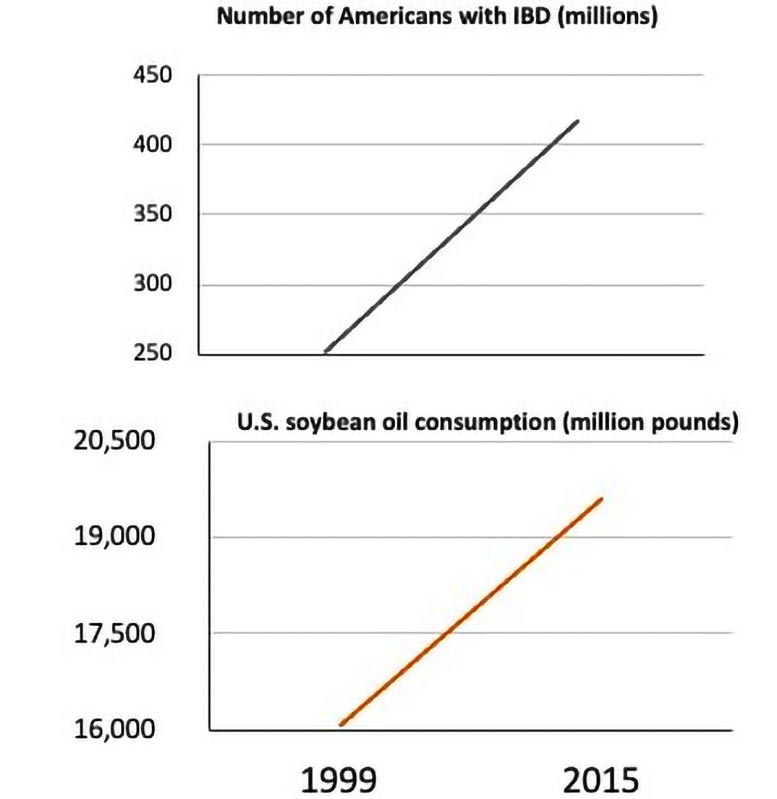
The increase in IBD parallels the increase in soybean oil consumption in the U.S. Credit: Sladek lab, UC Riverside. Data from Dahlhamer et al, 2016; USDA
Sladek noted that linoleic acid is an essential fatty acid. The soybean oil the researchers used in their experiments had 19% linoleic acid. The American Heart Association recommends 5 to 10% of daily calories be from omega-6 polyunsaturated fatty acids, such as linoleic acid, in order for the heart to remain healthy. Many seed oils – safflower and sunflower, for example — are sources of linoleic acid. Animal fat can also be a source.
“Every animal has to get linoleic acid from the diet,” Sladek said. “No animal can make it. A small amount of it is needed by the body. But just because something is needed does not mean a lot of it is good for you. Several membranes in the body, in the brain, for example, require linoleic acid for the cells to function properly. If all we ate was saturated fats, our cell membranes would become too rigid and not function properly. Future studies are needed to determine the tipping point for how much daily linoleic acid consumption is safe.”
According to Sladek and Deol, olive oil, which has lower amounts of linoleic acid, is a healthier oil to consume.
“Olive oil, the basis of the Mediterranean diet, is considered to be very healthy; it produces less obesity and we have now found that, unlike soybean oil, it does not increase the susceptibility of mice to colitis,” Sladek said.
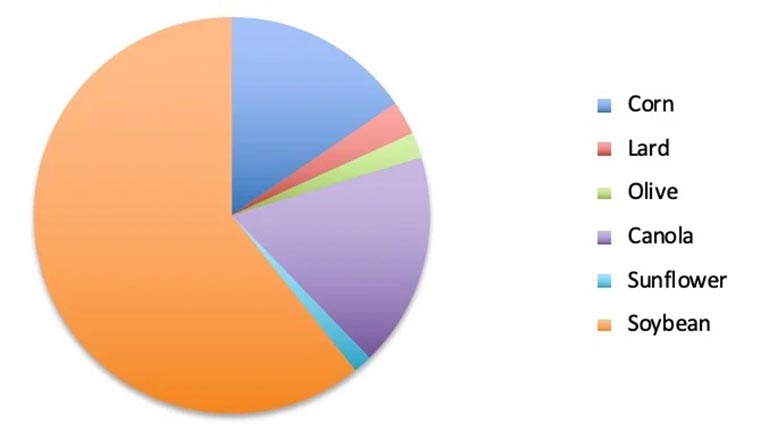
Chart depicts consumption of edible oils in the U.S. for 2017/18. Credit: USDA
James Borneman, a professor of microbiology and plant pathology at UCR and a co-corresponding author on the paper, is an expert on the gut microbiome. He has collaborated at UCR with several groups on research projects, including studies investigating how gut microbes prevent obese people from losing weight. For the current study, he teamed up with Deol and Sladek to examine the gut microbes of the mice that were fed a high soybean oil diet.
“Adherent invasive E. coli contributes to IBD in humans, and the fact that we find this E. coli in these mice is concerning,” he said. “Sometimes, it can be unclear how research done in mice translates to humans, but in this study it is fairly clear.”
The research team was also surprised to find that the mice fed on a high soybean oil diet showed a reduction in the gut of endocannabinoids, cannabis-like molecules made naturally by the body to regulate a wide variety of physiological processes. At the same time, the gut showed an increase in oxylipins, which are oxygenated polyunsaturated fatty acids that regulate inflammation.
“We previously found that oxylipins in the liver correlate with obesity,” Deol said. “Some oxylipins have also been found to be bioactive in colitis studies. The bottom line of our current study is that a soybean oil-enriched diet similar to the current American diet causes oxylipin levels to increase in the gut and endocannabinoid levels to decrease, which is consistent with IBD in humans.”
Most processed foods in the U.S. contain soybean oil, perhaps explaining why many Americans have more than the recommended daily allowance for linoleic acid. Further, most restaurants in the U.S. use soybean oil because it is relatively inexpensive.
“Try to stay away from processed foods,” Sladek advised. “When you buy oil, make sure you read the nutrition facts label. Air fryers are a good option because they use very little oil.”
The researchers use olive oil for cooking and salads. Other healthy options for cooking, they said, are coconut oil and avocado oil. They cautioned that corn oil, on the other hand, has the same amount of linoleic acid as soybean oil.
“We recommend keeping track of the soybean oil in your diet to make sure you are not consuming excessive linoleic acid,” Deol said. “That is our take-home message.”
Reference: “Diet High in Linoleic Acid Dysregulates the Intestinal Endocannabinoid System and Increases Susceptibility to Colitis in Mice” by Poonamjot Deol, Paul Ruegger, Geoffrey D. Logan, Ali Shawki, Jiang Li, Jonathan D. Mitchell, Jacqueline Yu, Varadh Piamthai, Sarah H. Radi, Sana Hasnain, Kamil Borkowski, John W. Newman, Declan F. McCole, Meera G. Nair, Ansel Hsiao, James Borneman and Frances M. Sladek, 3 July 2023, Gut Microbes.
DOI: 10.1080/19490976.2023.2229945
Deol, Sladek, and Borneman were joined by Paul Ruegger, Geoffrey D. Logan, Ali Shawki, Jiang Li, Jonathan D. Mitchell, Jacqueline Yu, Varadh Piamthai, Sarah H. Radi, Sana Hasnain, Declan F. McCole, Meera G. Nair, and Ansel Hsiao of UCR; and Kamil Borkowski and John W. Newman of UC Davis.
The research was funded by grants from the National Institutes of Health, Crohn’s and Colitis Foundation, American Gastroenterological Association, UCR Metabolomics Core Seed Grant, UC Davis West Coast Metabolomics Center, and U.S. Department of Agriculture.





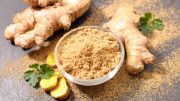
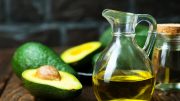


re first chart: “Number of Americans with IBD (millions) appears to be approximately 420 million for 2015. U.S. population is currently about 335 million. Chart should probably be in thousands, not millions.
This article tells me absolutely nothing useful. They didn’t say what happened when they dosed the mouse with the comparable amount of saturated animal fat. Nor did they relate to expected results in humans. I really think when I buy meat lately, and I like meat, but I tgink I am paying for piles of fake academic studies.
What would feeding mice a comparable amount of saturated animal fat tell you? It would be more instructive to feed them an equal amount of soybean oil that has been processed to remove all linoleic acid.